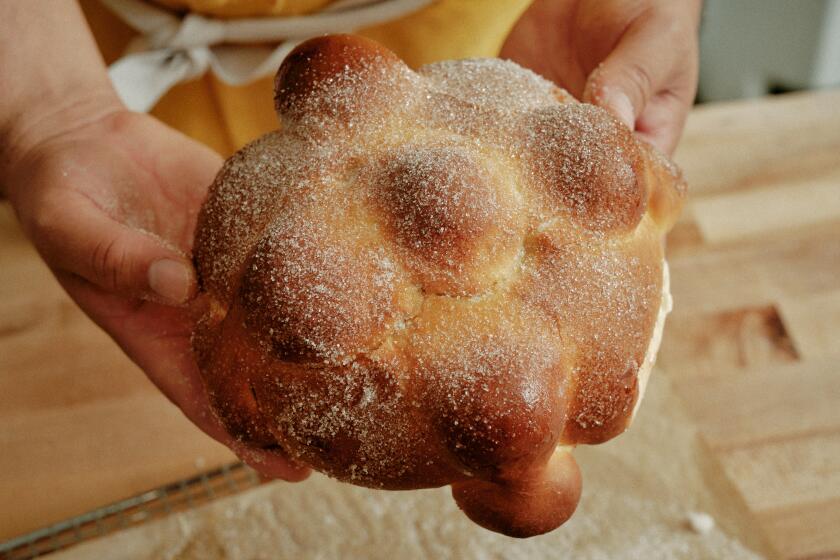Abundant Chicken Potpie
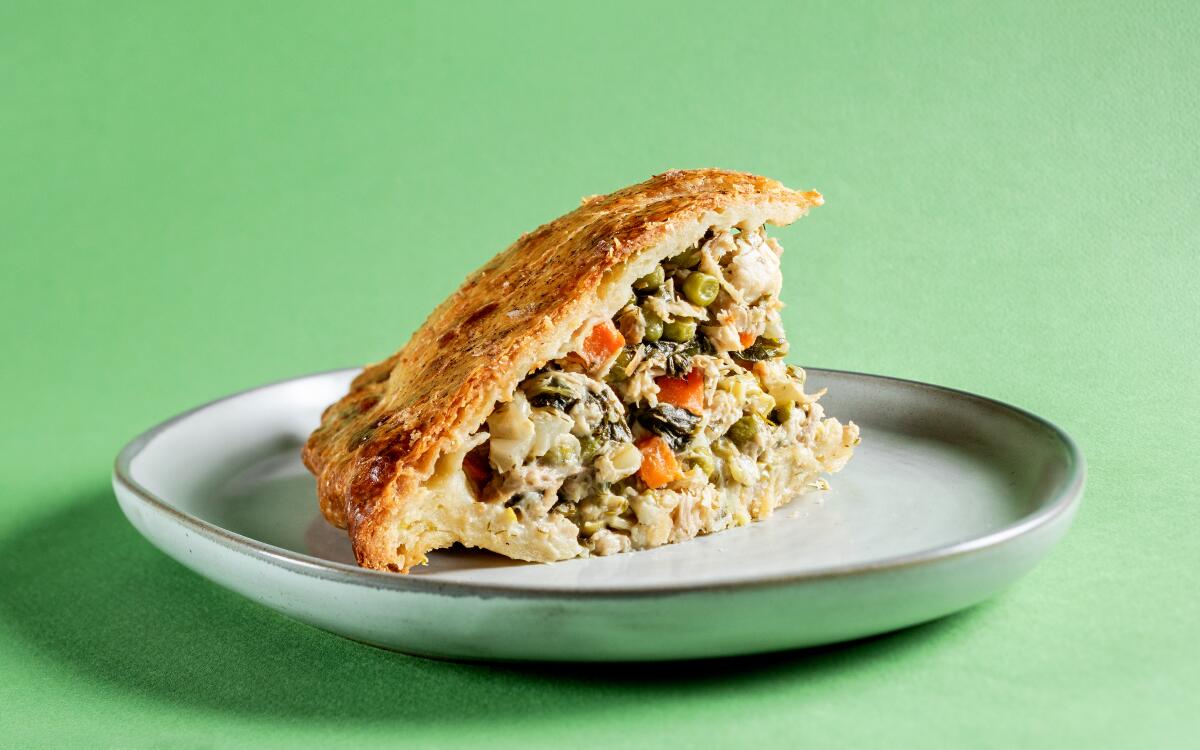
Prop Stylist Nia Lee / For The Times)
This summertime riff on a chicken potpie is all about having lots of fresh green produce and herbs in the filling so it’s lighter than wintertime versions. Whole milk in place of cream, and the use of Dijon mustard, lemon juice, and lots of parsley, dill and chives, help brighten up the veggie-loaded chicken filling. Cabbage and Swiss chard give the filling substance without distracting from the chicken and play well with the carrots and peas. The sugar in the pie crust is intentional, to give the dough flavor and balance, but if you’d prefer not to use it, you can omit it.
You can make the pie crust a day ahead, and poach the chicken and prepare the filling ahead of time too. Bring everything together day-of and put it in the oven for a brilliant lunch or dinner.
On a floured work surface, roll one chilled dough disk until 1/8-inch thick. Transfer to a 9-inch glass or ceramic pie dish, leaving a 1-inch overhang all around and trimming any excess. Place the pastry-lined pie tin in the refrigerator. Repeat rolling the second dough disk and place on a parchment-paper-lined baking sheet; place it in the refrigerator too.
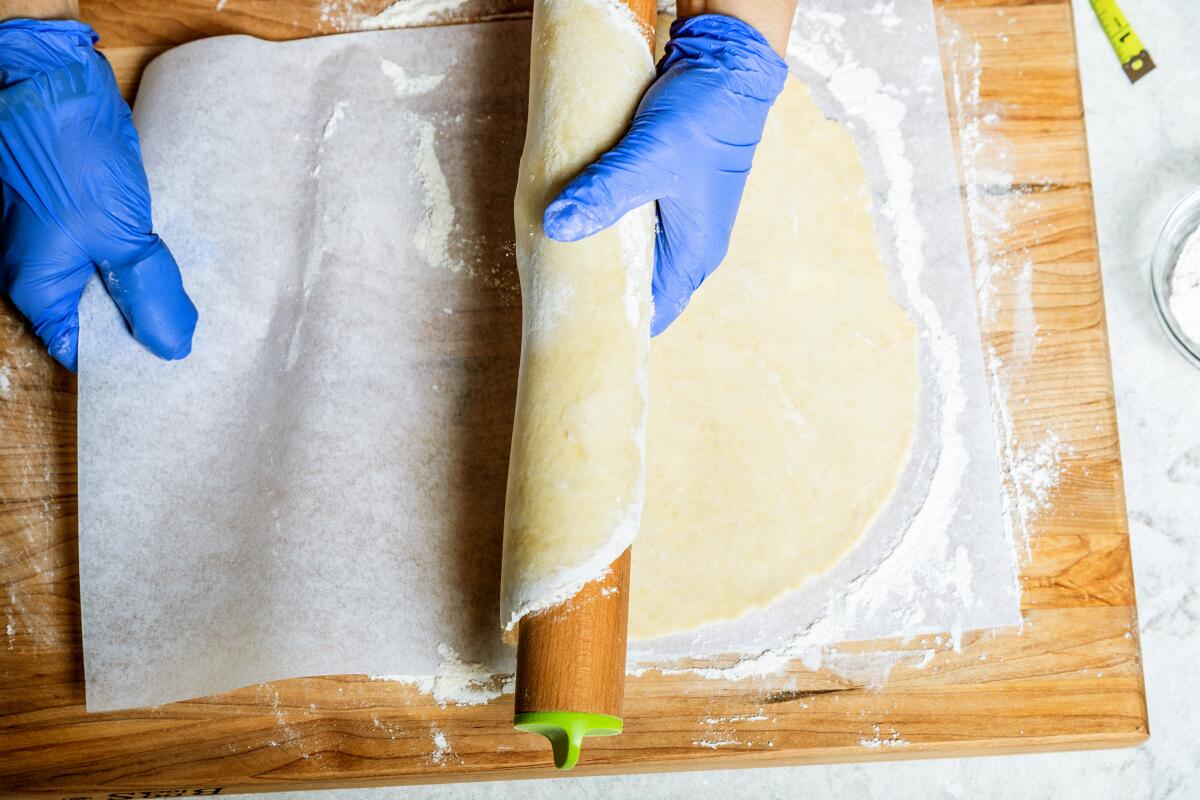
You can make the dough for the flaky pie crust the day before; wrap tightly and keep in the refrigerator.
In a small bowl, use a fork to mix together the egg and water to make an egg wash. Cover the bowl with plastic wrap and refrigerate until ready to use.
Make the filling: Chop enough parsley leaves to fill 1/4 cup, and chop enough of the dill and chives to fill 2 tablespoons each. Place all the chopped herbs in a small bowl, cover with plastic wrap and refrigerate until ready to use. Place the remaining bunches of herbs and stems in a large saucepan. Add the chicken and onion, then pour in enough cold water to just cover the chicken. Bring to a boil over high heat, then reduce the heat to maintain a gentle simmer and cook until an instant-read thermometer inserted in the thigh of the chicken reads 160 degrees F, about 30 minutes.
Using tongs or a large spoon, lift the chicken from the pot, letting it drain briefly, then transfer to a cutting board. Remove the pot from the heat, but don’t disturb the cooking liquid. Once the chicken is cool enough to handle, remove and discard the skin, then pick apart the meat and tear into bite-size pieces; transfer all the meat to a large bowl. Return all the bones to the cooking liquid, then return the liquid to a simmer and cook, covered slightly, until reduced to a rich stock, about 1 hour.
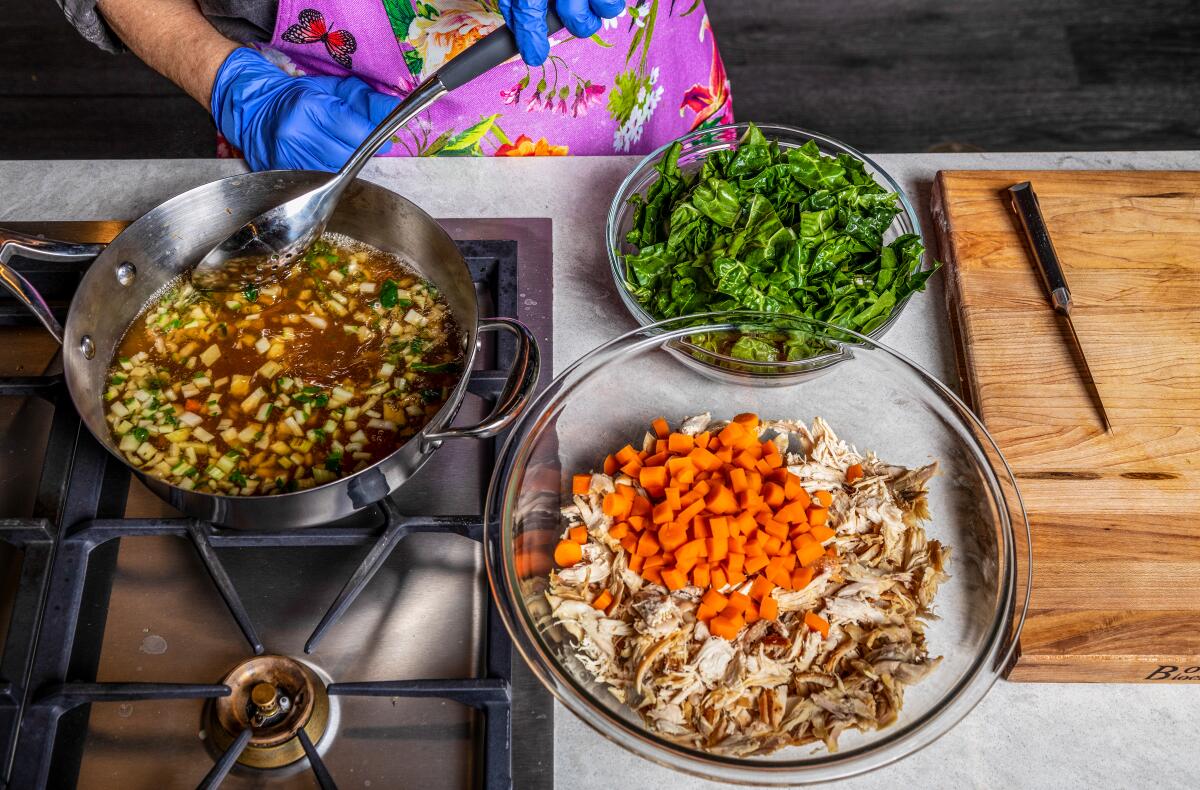
Pour the stock through a fine mesh sieve into another pot or large glass measuring cup; discard the onions and herb stems. Rinse out the pot, then pour the strained stock back into it. Return the stock to a simmer, then add the carrots and cook until a paring knife inserted into the thickest pieces slides in and out easily, about 10 minutes. While the carrots cook, remove the stems from the Swiss chard and cut into 1/4-inch-thick pieces; cut the leaves into large 2-inch pieces.
Using a slotted spoon, remove the carrots from the stock and add to the bowl with the chicken. Add the Swiss chard stems to the stock and cook for 2 minutes. Add the Swiss chard leaves to the stock and cook until the leaves and stems are tender, about 2 minutes more. Using the slotted spoon, remove the leaves and stems from the stock, letting them drain briefly over the pot, and add to the bowl with the chicken and carrots. Pour the stock into a large glass measuring cup or heatproof bowl and set aside until ready to use.
Return the pot to the stove over medium heat and add 2 tablespoons butter. Once the butter melts, add the cabbage and garlic, and cook, stirring occasionally, until the cabbage is tender and just starting to turn light golden brown at the edges, about 4 minutes. Scrape the cabbage into the bowl of chicken and vegetables and return the pot to the heat.
Melt the remaining 3 tablespoons butter in the pot, then add the flour and cook, stirring constantly, for 2 minutes to remove the raw flour taste. Pour in 1 cup of the reserved stock and the milk and cook, whisking constantly, until the liquid bubbles and thickens. Remove the pot from the heat and stir in the lemon juice and mustard. Scrape all the sauce from the pot into the bowl of chicken and vegetables, add the frozen peas and reserved chopped herbs, then gently stir everything together. Season liberally with salt and pepper.
Heat the oven to 450 degrees F. Remove the pastry-lined pie dish, the second rolled sheet of pastry and the egg wash from the refrigerator. Spoon the chicken mixture into the pie dish, mounding it in the center. Using a pastry brush, brush the pastry on the edge of the pie dish with some egg wash, then place the second sheet of pastry over the filling, pressing gently at the edge to seal the two crusts together. Trim any excess pastry so the top sheet aligns with the bottom sheet, then fold the overhanging edges under to form a thick rim on the edge of the pie dish. If you like, crimp the edge of the crust with your fingers or a fork. Brush the top of the pie with egg wash, then cut three slits in the top of the pie crust. Sprinkle the top with flaky sea salt and more black pepper.
Place the pie dish on a parchment-paper- or foil-lined baking sheet and bake for 15 minutes. Reduce the oven temperature to 350 degrees F, and continue baking the pie until the crust is deep golden brown all over and you can see the filling bubbling through the slits in the top crust, 35 to 45 minutes more. Remove the pie from the oven and let cool for at least 30 minutes before serving.
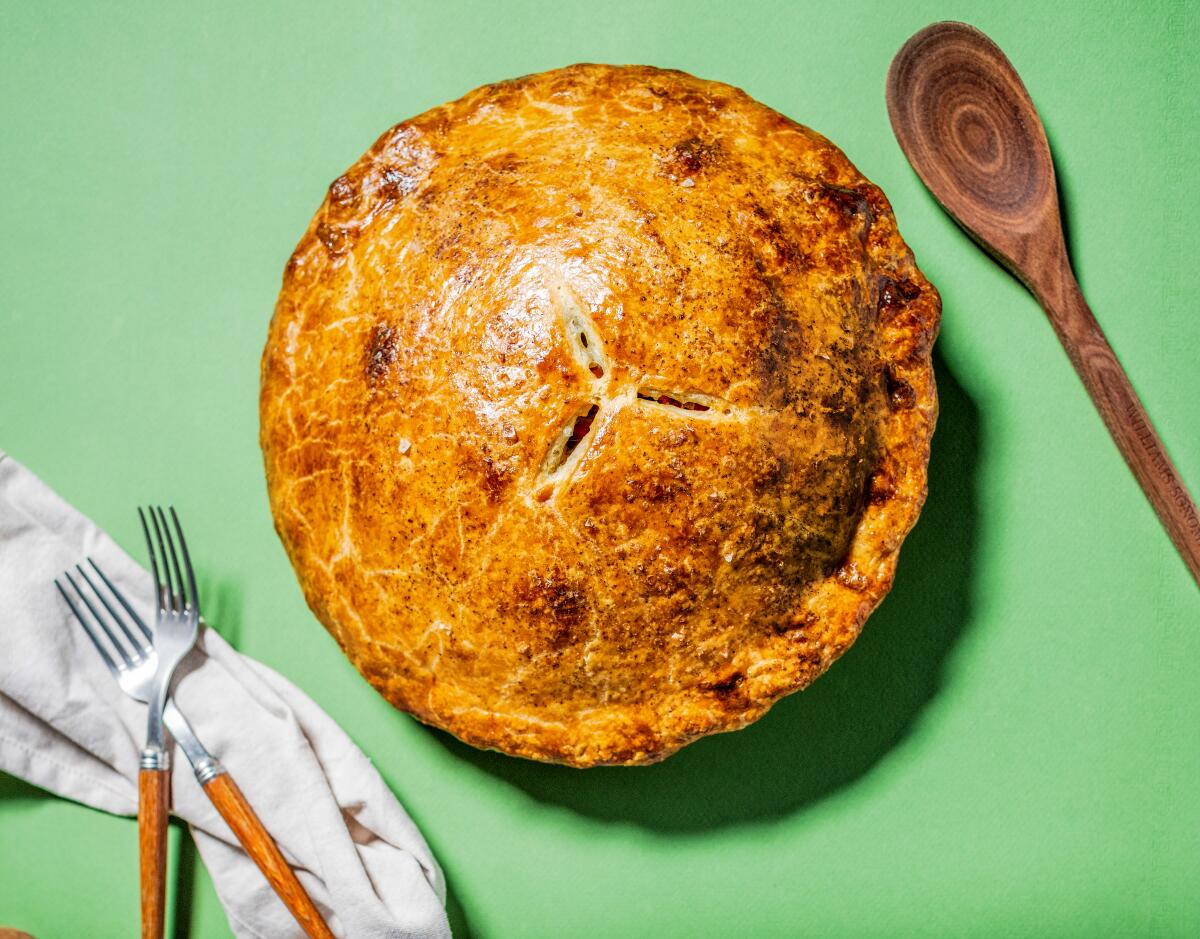
Basic Pie Pastry Dough
In a large bowl, whisk together the flour, sugar and salt. Add the butter and use your fingers to pinch and rub it into the flour repeatedly until pea-size crumbles form. Pour in the water and use a fork to toss (not stir) the butter-flour mixture until it’s evenly moistened.
Scrape the crumbly mass onto a clean work surface and pat and smush gently until it starts to form a solid piece of dough. Cut the dough in half, then flatten each piece into a disk, patting the edges to smooth them. Wrap each disk in plastic wrap and refrigerate for at least 1 hour or up to 2 days.
After 2 days, freeze the pastry to store long-term, letting it thaw for 1 day in the refrigerator before using.
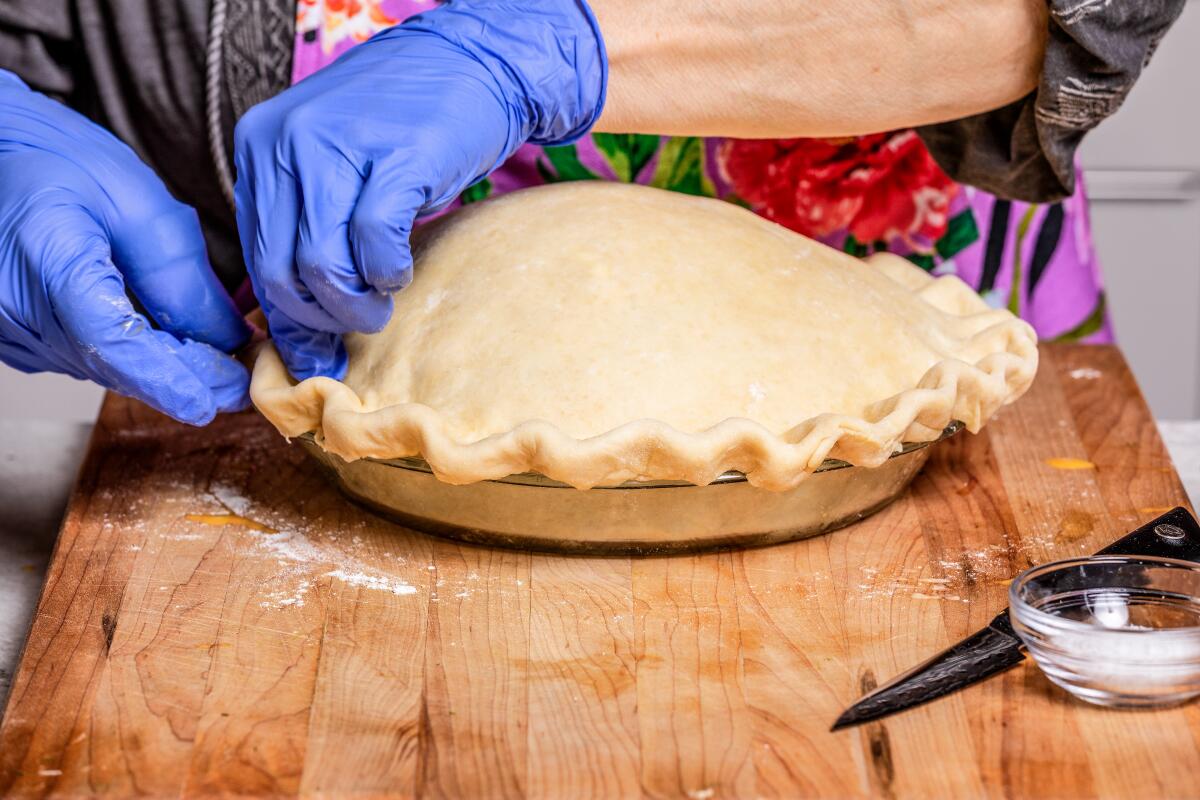
Get our Cooking newsletter.
Your roundup of inspiring recipes and kitchen tricks.
You may occasionally receive promotional content from the Los Angeles Times.










